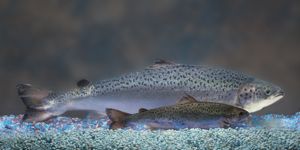House Gives Transgenic Salmon The Hook
Published: February 6, 2018
By Jeff Young

AquaBounty claims the flesh of its genetically engineered salmon (large one above) is indistinguishable from that of normal farm raised salmon. But Congress has moved to block FDA approval.
Controversial genetically engineered fish would be the first transgenic animal approved for human consumption. But an unlikely bipartisan alliance in Congress is blocking FDA approval.
By Jeff Young
The U.S. House of Representatives has voted to block FDA approval of transgenic salmon. Reps. Don Young (R-Alaska) and Lynn Woolsey (D-California) cosponsored the amendment to an FDA appropriations bill that would prevent any funds being used for approval of the genetically engineered salmon.
The move comes as the company AquaBounty appeared near approval for its controversial product, which would have been the first genetically engineered animal intended for human consumption.
AquaBounty CEO Ron Stotish criticized the vote and accused Rep. Young of “shenanigans” that interfere with science-based assessments of food safety.
“It is astonishing that Young and a few colleagues would try to game the system in this way," Stotish said in a statement.
Rep. Young, a conservative with a poor environmental record, is a promoter of Alaska’s wild-caught salmon fishery and a frequent critic of farmed salmon. His desire to protect his home state industry created the opportunity for an unlikely alliance with the environmentally-minded Rep. Woolsey.
Critics of genetically modified foods cheered the vote.
“We thank members of the House for stepping in to correct FDA’s misguided decision to go ahead with this approval process which fails to take into account a plethora of economic, human health, environmental and animal welfare concerns,” said Andrew Kimbrell, Executive Director of the Center for Food Safety.
Beyond the effect on AquaBounty’s product, the house vote might also trigger a review of how FDA goes about considering transgenic animals. The Center for Food Safety found flaws and shortcomings in the process, which does not appear well adapted to the special considerations and challenges genetically modified products present. For example, there would likely be no mechanism to ensure that genetically modified animal products would even carry a label to let consumers know what they were buying.
In an interview with Living on Earth last September Stotish said he would fight any attempt to require such labels. “We think that would probably be an adequate barrier that it would kill the product and never give it a chance to even be tested.”
Back to Living on Earth
Living on Earth wants to hear from you!
Living on Earth
62 Calef Highway, Suite 212
Lee, NH 03861
Telephone: 617-287-4121
E-mail: comments@loe.org
Newsletter [Click here]
Donate to Living on Earth!
Living on Earth is an independent media program and relies entirely on contributions from listeners and institutions supporting public service. Please donate now to preserve an independent environmental voice.
NewsletterLiving on Earth offers a weekly delivery of the show's rundown to your mailbox. Sign up for our newsletter today!
 Sailors For The Sea: Be the change you want to sea.
Sailors For The Sea: Be the change you want to sea.
 The Grantham Foundation for the Protection of the Environment: Committed to protecting and improving the health of the global environment.
The Grantham Foundation for the Protection of the Environment: Committed to protecting and improving the health of the global environment.
 Contribute to Living on Earth and receive, as our gift to you, an archival print of one of Mark Seth Lender's extraordinary wildlife photographs. Follow the link to see Mark's current collection of photographs.
Contribute to Living on Earth and receive, as our gift to you, an archival print of one of Mark Seth Lender's extraordinary wildlife photographs. Follow the link to see Mark's current collection of photographs.
 Buy a signed copy of Mark Seth Lender's book Smeagull the Seagull & support Living on Earth
Buy a signed copy of Mark Seth Lender's book Smeagull the Seagull & support Living on Earth

